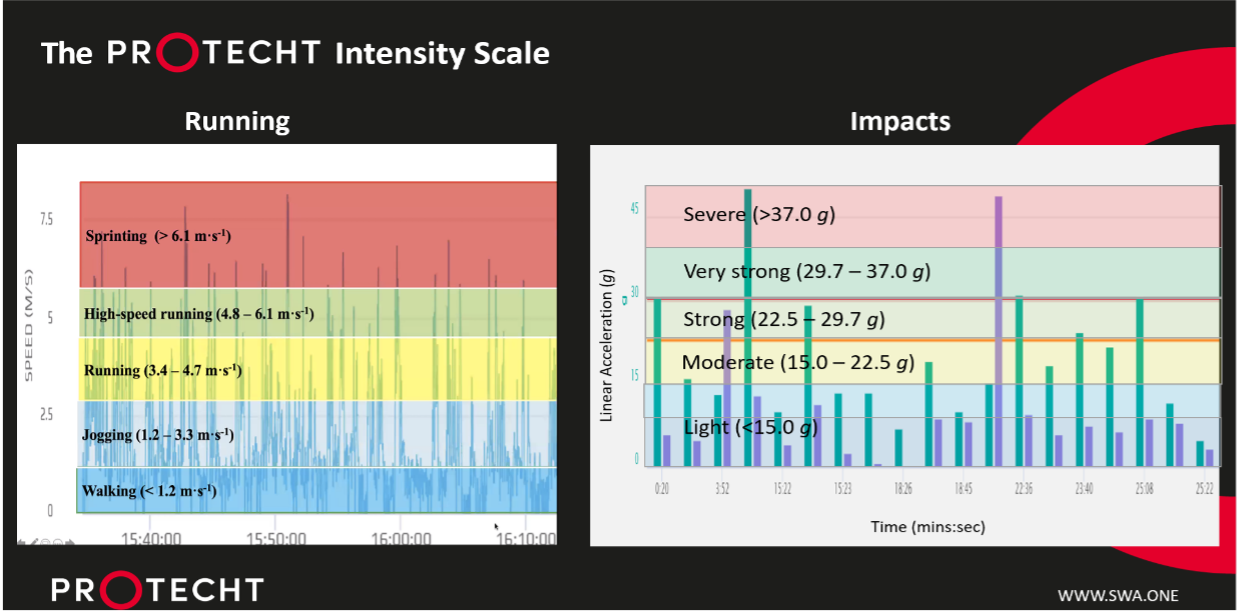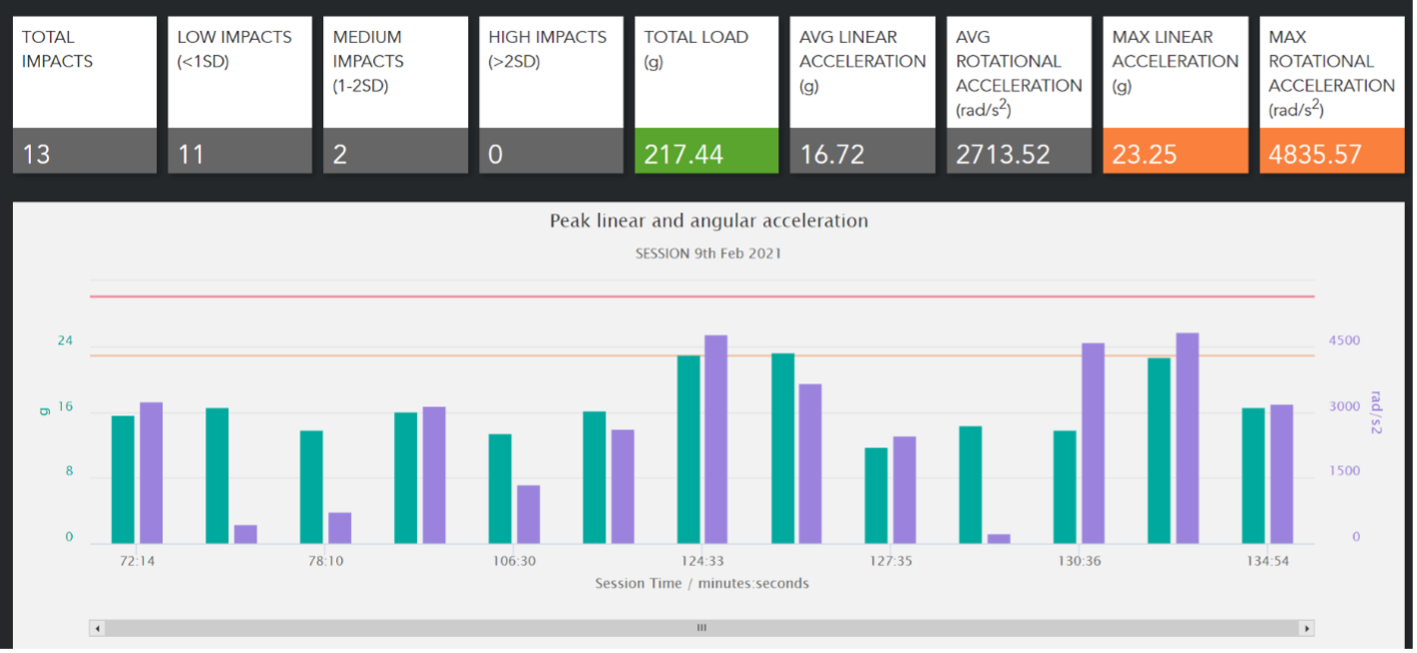
The year has started with a flurry activity for the team here at Sports & Wellbeing Analytics. Whilst our accurate, valid and reliable way of monitoring head impact is clear to the teams and athlete’s we are working with, the real value of our work is in the analysis and insight we provide to help improve both player welfare and team performance. We are constantly trying to explore and push the boundaries of what is possible with the data. The new insights we are able to deliver and the work our Sports Scientists do with the teams and athlete’s they support are creating new and exciting opportunities for both performance and welfare.
We were proud to announce earlier this month our partnership with Salford Red Devils in Rugby League. In recent times Salford have been praised for managing their small squad so well and still reaching Grand Finals. Their emphasis on delivering great performance through player welfare has paid dividends for them and we are delighted that they are working with us to help them drive this ethos even further.
This is the first of what will be a series of exciting news as we begin to make significant strides in a number of other sports. We are looking forward to sharing these developments with you in the near future.
We know that Rugby’s leaders at every level take improving player welfare and safety very seriously and are pleased to have been involved in conversations at all levels of the game in both codes. Whilst the team’s we work with are enjoying significant performance benefits, it is equally important to us that the games administrators continue to talk to us about how PROTECHT can help with a much wider playing population.
As always, we are open for any discussion and where we can, want to help player welfare and team performance through data driven decision making.
You maybe have seen our recent press release regarding our new relationship with Salford Red Devils, the first rugby league team to link with PROTECHT. The partnership has been mentioned in numerous articles.
Morning Star Online:
https://morningstaronline.co.uk/article/s/salford-use-gum-shields-containing-microchips-monitor-impact-collisions
Manchester Evening News:
https://www.manchestereveningnews.co.uk/sport/rugby-league/salford-red-devils-concussion-mouthguards-19887981
Love Rugby League:
https://www.loverugbyleague.com/post/salford-to-use-microchipped-mouthguards-to-monitor-impact-of-collisions/
Channel News Asia
https://www.channelnewsasia.com/news/sport/rugby-league–salford-to-use-microchipped-mouthguards-to-monitor-collisions-14262012
Our lead Sport Scientist Lee Melotti has also been looking at the language around contact in his blog read Part 2 here, ‘Mind your language’.
Having to adapt to the current situation, the week usually starts off with a Covid 19 test. We have been very fortunate to have been able to carry on working in person with our clubs during these difficult times and something I have been really grateful for, as I know for many this has been a really tough time. Despite this, like most we have still had to adapt in other areas as a team, working from home when not supporting our clubs in the field.
The most important role of the week comes from providing support to our clubs whether on the ground or remotely through data analysis and feedback. After collecting match data over a weekend the emphasis of the start of the week is to analyse this data. Each impact recorded has its own time stamp and this allows all of our match data to be video aligned. These impacts are then coded which helps inform our analysis when looking at trends between certain impact events and collision types.
For many clubs Tuesday is a main training day and often has a high contact element. When on the ground the running of the Protecht system is incredibly simple. The guards are placed on charge a few hours before training. The receiver is then set up pitch side and data collected live straight to the laptop. With the laptop pitch side, during the session we can break training down into segments corresponding to the training drills. Long term, this allows us to create a drill database to help understand the contact demands of each drill in training. Similarly, data is also collected for the Return to Play (RTP) players. Quantifying the RTP process is really important. From a contact load perspective, understanding game and training demands we can use this as an end goal to work back from, but also help to quantify the demands of these events. Something that has not previously been done before.

With the quantification of contact load being a new area in performance it is important that we are constantly creating insight as a sport science team as we’re often using data that is relatively new for our clubs support staff. Our intensity scale stems from the lack of established or clear terminology in relation to contact and the acceptance and clarity of running based terminology.

Using an intensity scale to quantify our impacts we see that most competition demands consist of lower intensity impacts, higher in volume and higher intensity impacts lower in volume.
Thursday, typically the second biggest training day for most clubs, support is also provided remotely. Remote support can involve analysing the data that the club staff on the ground have synced to the cloud. This support is often useful to our clubs and can help provide specified insights that they may be interested in. However, when looking at individual breakdowns and general trends from a session the benefits of the system is that the live dashboard and analytics allows a lot of this to be done automatically, reducing the need for time consuming data breakdown.

Above is an example of one of the dashboard pages. Here we can navigate through our individual players list and break the session down by a number of variables looking at both volume and intensity metrics.
CPD is also really important and a section of our Fridays usually consist of department discussions around a specific topic. This week we discussed “Wearable Technology and Analytics as a Complementary Toolkit to Optimize Workload and to Reduce Injury Burden”. With the growing acceptance in rugby of the need to quantify contact load in greater detail than just impact count due to its relationship with performance, injury and recovery, having this means to monitor these demands is essential. Helping inform the balance between prescribed training and the recovery so that performance is optimised, and injury/illness minimised.
Typically match day for most of our clubs. Recording data live allows medical to highlight any unseen significant impacts a player has received. Combining this with live pitch side replays allows a greater amount of information for staff to base player assessments on.

The team dashboard shown above updates live and post-match can be exported in several formats to combine with the clubs other load monitoring tools. Aligning this with the video post-game also allows for greater context to each event.

Privacy Policy
Copyright 2020 Sports & Wellbeing Analytics Limited – All Rights Reserved
Website by Waters